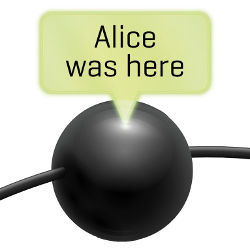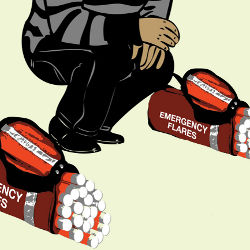Imagine a set of red and blue hill towns connected by a network of roads. When a person from a red town travels through a blue town or vice versa, things can get unpleasant.
Dennis Shasha
You have three covered boxes of Burmese rubies before you. You know there are a total of 30 identical seven-carat rubies in the three boxes.
Consider 16 cards consisting of the ace through 8 of hearts and the ace through 8 of spades. You are allowed to arrange the cards as you wish. Your opponent chooses a number between 1 and 8.
In the spirit of Gomoku, two people play a version of the classic paper-and-pencil game tic-tac-toe but on an infinite checkerboard. In it, a player wins by getting four pieces in a row — vertically, horizontally, or diagonally.
In this cooperative game, two players want to meet each other in a graph as quickly as possible.
A group of people is sitting around your dinner table with one empty chair. Each person has a name that begins with a different letter: A, B, C . . . Because you love puzzles, you ask them to rearrange themselves . . .
Upstart Puzzles: Sleep No More
We begin simply, with a 60-minute clock that counts only minutes, from 0 to 59. The alarm can also be set from 0 to 59 and will go off when the clock reaches the same value.
Imagine a 500-square-by-500-square red/black ice checkerboard with walls along all four edges.
Upstart Puzzles: Auction Triplets
There are objects of four types and n people, each with a budget of $99. The objective of each one is to acquire three objects of the same type (any type) before anyone else does.
You are given two bags, each containing some number NumPerBag of flares. You know there are NumBad flares in one of the bags but not which bag. The other bag has all good flares. Each time you test a flare, you use it up.
Shape the Future of Computing
ACM encourages its members to take a direct hand in shaping the future of the association. There are more ways than ever to get involved.
Get Involved








